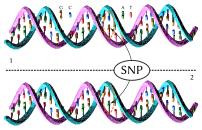Cancer and Genome Wide Association Studies (GWAS)
Recently, interest in genome-wide association studies (GWAS) has increased considerably in the field of human genetics.
In simple terms, GWAS involves looking at up to a million pieces of common genetic variation throughout the genomes of thousands of patients with different diseases and comparing them with healthy people (controls) to identify variants that are more common in disease states.
Image via Wikipedia
This approach has yielded a huge body of useful information about the genetic basis of common diseases and complex traits compared to decades of previous research, so it looks like it could be here to stay.
Three of the main technology companies in this area are Affymetrix, Sequenom and Illumina. The GWAS has expanded as technological innovation allowed genotyping chips. These are tiny glass chips covered with probes, which are bound to fluorescently tagged DNA and provide extremely accurate read-outs of the sequence at hundreds of
thousands of common variable sites or single nucleotide polymorphisms (SNPs). A SNP (pronounced ‘snip’) is a change from a single base in the DNA from the usual base at that position (see graphic).
To give an example of how cool this technology is and how it is applied to cancer, you can read a simple non-technical overview in PDF. It’s an interesting application of how genetic differences between ethnicities may determine breast cancer prognosis. This is important information that can help physicians decide what treatment a patient should receive in order to maximise the effectiveness.
Ultimately, it is likely that the SNP chips will give way to full genome scans as costs come down, but for now, the field is still in it’s relative infancy and can only get better with more technological innovations and we learn more about epigenetics in general.
Any views or thoughts?
![Reblog this post [with Zemanta]](http://img.zemanta.com/reblog_e.png?x-id=bc5a83b2-b8ce-42a0-9229-4c9f55196e7d)
